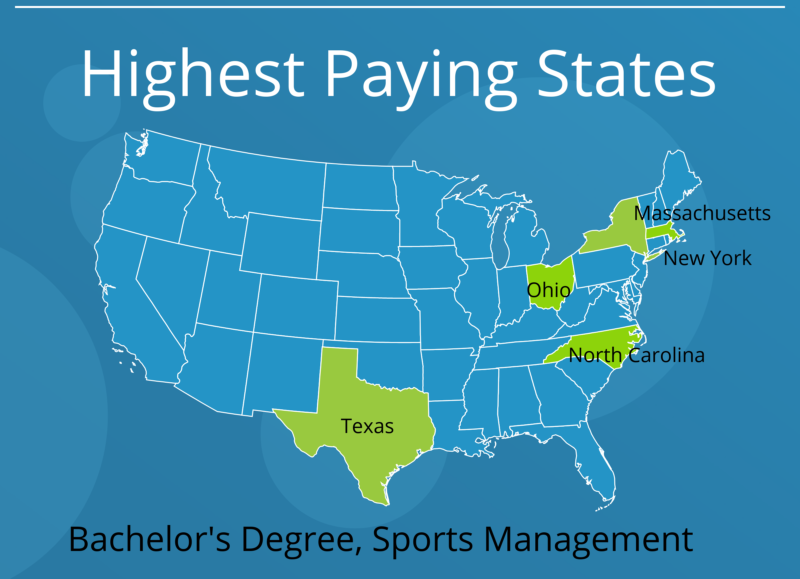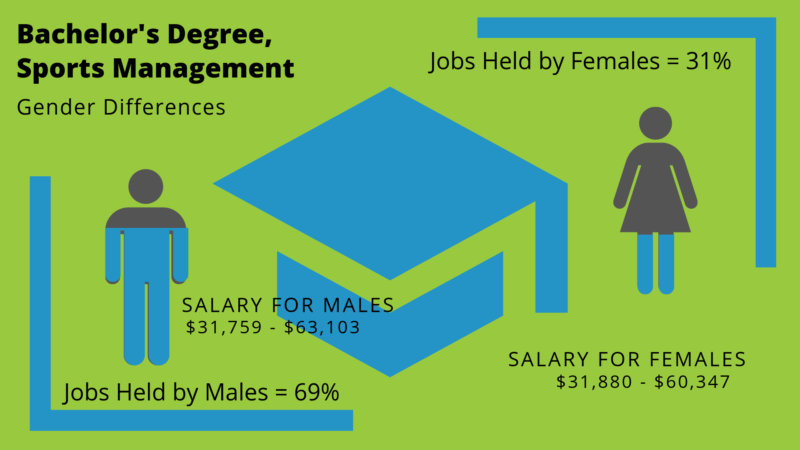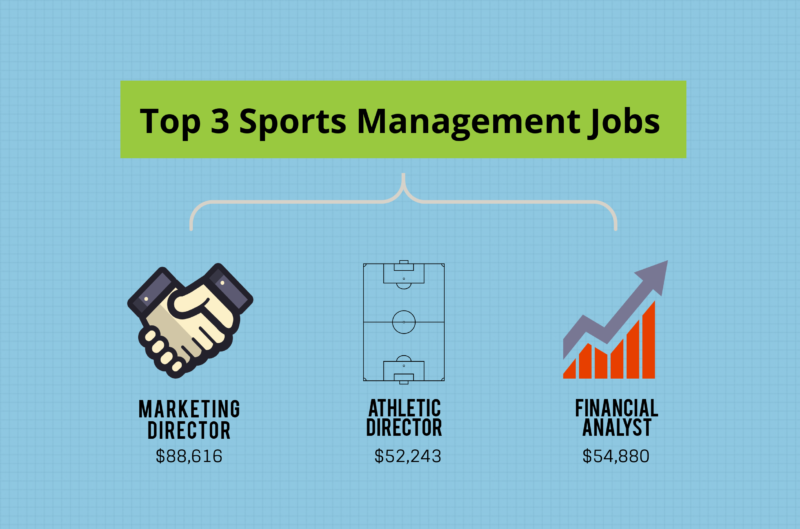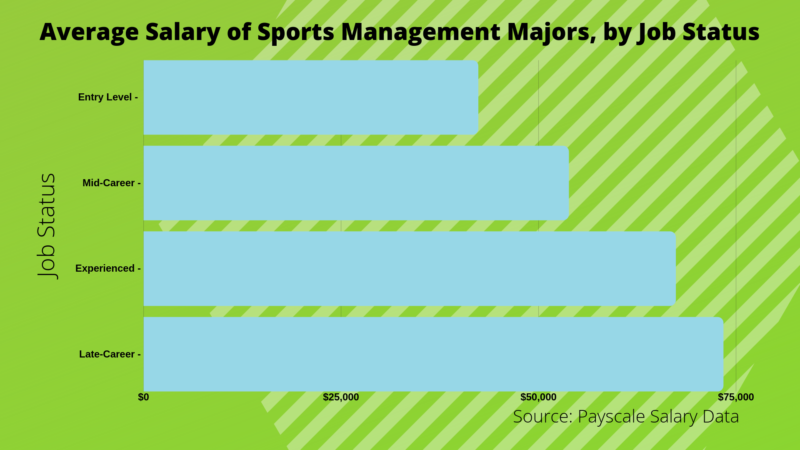Key Information:
- Sports management degrees open doors to various careers, including sports marketing, event management, athletic administration, and sports analytics.
- Programs typically cover key areas such as sports law, finance, marketing, and event management.
- Many programs emphasize practical experience through internships, providing students with real-world exposure and valuable industry connections that can increase their career prospects.
- The sports industry is expanding, creating increasing demand for professionals with specialized knowledge in sports management.
Sports management is not a single thing. In fact, anything that deals with any business aspect of any sport can fall within the purview of sports management. Sports managers are out front, behind the scenes, and on the sidelines. A sports management degree offers a lot more than many people think.
From the start, potential applicants will want to know the pros and cons of sports management. When considering a sports management career, applicants should know the field is a large one and very rewarding. Nevertheless, sports management, like any other field, does come with its share of challenges.
The pros and cons of sports management weigh heavily in favor of the pros. For example, a sports management career is not tied to a single sport or league, like being a professional athlete — and you never age out or get dropped for an injury. The sports industry is incredibly large and global. In that sense, applicants will always find opportunities. Still, the field, much like what it represents, can become incredibly competitive.
While some may see competition as a con, it is important to understand competition only exists for some very specific types of sports management careers. With a field as wide and open as sports management, there is room for anyone who wants to pursue a sports management or sports administration career.
Related:
- Best Bachelor’s in Sports Management Degree Programs
- Best Online Sports Management Degree Bachelors Programs
- Fastest Online Sports Management Degree Bachelors Programs
- Most Affordable Online Sports Management Degree Bachelor Programs
Education for a Sports Management Career
Obtaining a sports management degree starts with a school or program dedicated to that specific field of study — one that is simultaneously very specific, and very broad. Many schools offer sports management classes of one type or another. For applicants trying to decide between all the options, there are a few factors that can help make the decision easier.

Sports Management Accreditation
As with any school or program of higher learning, accreditation is extremely important. A school without proper accreditation is a risky proposition best avoided by anyone serious about the sports management industry. Many jobs will not even consider someone if they graduate from a program without proper sports management accreditation.
Any school or program should have regional accreditation. Regional accreditation means the school or program meets or exceeds the educational standards set by the US Department of Education. A college or university should have accreditation from one of the six recognized accrediting bodies (which are determined by region, including New England, the South, the Midwest, and so on).
But specifically for sports management, accreditation mostly falls under the purview of the Commission on Sports Management Accreditation. COSMA is the de facto accrediting body for sports management. COSMA accreditation represents a joint initiative between NASPE and NASSM sport management programs.
The NASPE, or National Association for Sport and Physical Education, is the largest of the SHAPE America professional organizations. The organization includes thousands of professionals in the physical education field. The group publishes standards for sports and physical education ranging from the grade school level to the professional level.
Finding a school with NASPE standards or one containing NASPE members on the faculty is a boon to any applicant pursuing sports management. Since the NASPE and NASSM created COSMA accreditation, an applicant can have peace and assurance a college or program bearing the marks of these organizations is one they can trust their education to.
Reputation: No two programs are alike. Some programs, even with good accredited standards, are not always recognized as the best. Applicants do not have to seek out the best of the best when it comes to a sports management program. Still, applicants should definitely pay attention to the reputation of the program they are considering.
Range of Available Classes: Not all sports management degrees are the same. Since an applicant can choose a degree specialty, it is important to look for schools or programs that offer a range of classes to facilitate customization of the degree.
As sports management itself isn’t just one thing, an applicant will want the classes that give them a core curriculum but also classes that allow them to learn what they need for specific niches, industries, and fields.
Additionally, a school that offers related degrees can also become beneficial to an applicant. For example, pursuing a sports management degree may also come with an interest in sports journalism or sports medicine.
Convenience: Beyond some of the larger considerations, applicants need to look at what the program offers by way of scheduling, location, and online courses. Someone seeking a degree in sports management will need some convenience to help him or her along the way. To that end, they should look for a program with a curriculum and schedule they can stick to and get the most out of.

Types of Sports Management Degrees
A sports management degree can come in a few varieties. Generally, a conventional 4‑year sports management major will culminate in a Bachelor of Science in Sports Management. However, it is also possible to obtain a Bachelor of Arts in Sports and Recreation Management.
When an applicant looks for sports management degree programs, they are most often considering the BS degree rather than the BA, because courses in the BS will be more oriented toward the technical aspects of business, like mathematics and statistics. However, the BA can help someone who does not have a specific career or goal in mind by providing a more adaptable general education foundation.
The most important part of a sports management degree is specialization. Sports management, as a category, included everything from managing athletes to scouting to selling merchandise and maintaining facilities, so specialization helps narrow down the career path. So even when pursuing a BS, an applicant should fine-tune their education to line up with one of the specialized sports management major disciplines.
The best colleges for sports management will have programs and classes that allow applicants to choose the path they want, rather than a strict, unerring curriculum. A bachelor’s in sports management can veer towards these and more specialties:
- General sports management
- Sports accounting and finance
- Sports agent
- Sports analytics
- Sports business administration
- Sports fitness and wellness
- Sports marketing
- Sport psychology
- Sports retail management
- Sports risk management
Other specialties exist, and choosing one from the sports degrees list will represent an important decision for applicants. The best sports management colleges and universities will have programs to assist applicants in choosing what they would like to do, beyond sports management.
In some programs, the degree name will change depending on the specialty. For example, a sports administration degree is still a sports management degree, but it will have a narrower focus. A sports administration major may graduate with a BS in Sports Administration, but that degree holds as much weight as a sports management degree.
In this particular example, the terms management and administration are sometimes used interchangeably. In some circles, administration implies working with sports organizations at the business level, while management refers to working with the talent as individuals or groups.
Applicants seeking a sports management degree of any type would do well to simply search for things like the top 10 sports management programs or the top 10 sports management colleges. Also search out scholarship opportunities; many programs provide generous support for promising students.
Online sports management degree schools are also viable. When looking at online sports management degree classes, applicants should follow the same basic rules of looking for accreditation and reputation to start with. This also applies to specialized programs, such as an accelerated sports management program.
If the applicant has concerns over the type of bachelor’s degree offered, they should go over the sports management degree requirements and make sure they know precisely what it is they want from the program. Sports management degree colleges usually offer more than one degree path, or give students flexibility in the courses they can take so they can tailor their degree to their interests.
Online Sports Management Degree Programs
Yes, it is absolutely possible to earn a sports management degree online. Applicants need not worry, as online degrees in sports management are just as reputable as a degree from any brick and mortar college or university. Online sports management degrees from accredited programs are definitely taken seriously.
As with any kind of school or program, applicants must pay attention when selecting online sports management programs. Sports management degree programs aren’t all the same and finding one that fits an applicant’s needs will require research and attention to the finer details offered by the online sports management program. Some are focused on speed; some are focused on convenience; some are focused on experience.
Online sports management courses can be taken completely virtually, but some programs may require an applicant to visit campus at some point, either for an orientation or for a summer intensive. This will depend on the program chosen and the location of the applicant. Nevertheless, it is often possible to complete a sports management degree fully online.
Applicants can still choose specialties as well with a sports management degree online. A sports analytics degree online or an online recreation management degree are just two of the most common online specializations available. Some applicants may choose to procure an associate’s degree in sports management online and then try a different venue to go forward with their bachelor’s. Getting a job with an associate’s degree can get your foot in the door while earning higher degrees.
Other courses, such as sports management courses online free of charge do exist. An applicant can find free courses, such as those offered through Massive Open Online Courses (MOOCs) and various other places. These types of free online sports management courses can vary a great deal.
Some free online courses can offer a recognized credit, but that is not a given. Some can give a credit only if the person taking the free course is already enrolled in a participating school.
In some cases, a free online sports management course can only offer educational materials to brush up or get a feel for the subject. Using free online sports management course to earn certificates is a good way to boost an applicant’s portfolio.
An online sports management certificate can help fill out a portfolio or show that an applicant gained further education or specialization beyond their degree. In all these ways, online degrees in sports management offer many options for those who want to take a non-traditional route towards their sports management degree.

Certifications/Licenses for Sports Management
Sports management certification varies widely. Applicants should understand that a sports management certificate is not strictly necessary to enter into a sports management career. However, certification can often help an applicant in several ways.
Receiving a certification while pursuing a sports management degree can help an applicant find entry-level work while they are in school. Certification after obtaining a degree can help an applicant prove their competency in a specific specialty.
Some leagues, agencies, or other sports-related groups may require someone to obtain a certain type of certification before they can become part of the management team in a particular capacity. Some states require specific types of certifications depending on the field the applicant chooses to enter into.
Licensing works in much the same way as sports management certification. The need for a sports management license will depend on the location of the applicant and the type of career the applicant is pursuing. Since no cut-and-dry answer exists, applicants must make sure they research the need for certification or licensing when following particular career trajectories.
Sports management certification is not the same as holding a sports management degree. This is important, as many programs will advertise a certification program as the means to achieving a sports management job.
In truth, a certificate with no degree can help someone gain an internship or entry-level job. But, sports managers typically require at least a bachelor’s before any organization will take them seriously.
When seeking a sports management certification, applicants must show care in how they go about the process. No one should choose just any sports management certificate program. Applicants should choose programs that align with their goals.
For example, a sports marketing certificate can help supplement the sports management degree for those applicants seeking to specifically enter the sports management field through marketing or sales careers. Sports management certification for facilities and event management will help complement a degree holder and shine a light on their ability to manage venues should they seek to go that route.
Careers in Sports Management and Administration
Sports administration jobs and sports management degree jobs encompass an exceptionally large number of career possibilities. At a very basic level, if the career involves sports of any type or at any level, then they are sports management degree jobs or sports administration jobs.
The sports management and sports administration definition is an open one. Every possible business aspect of a sport or recreational activity can represent sports management degree careers.
Sports management jobs tend to deal more with players and teams. These jobs tend to favor coaches, agents, trainers, and people who want to work directly with people. Knowing the business is still important, but these jobs require a more personal touch as well.
Sports administration degree jobs tend to deal more with the business aspect of sports and recreational activity. These jobs will have a heavier focus on things like marketing, advertising, building business relationships, and dealing with financials. These jobs tend to fall more behind the scenes.
A sports management job description may overlap with many of the same requirements of a sports administration job description. Applicants should pay close attention to these job descriptions, so they can have a good idea of what the employer really requires of them.
Sports administration internships can also help applicants learn the ropes when it comes to sports management and administration. Sports administration internships show up often in searches for sports administration jobs and sports management degree jobs.
What are some careers in sports management? The most popular careers in sports management can change each year. Some of the more current popular career paths in sports management include:
- Event coordinators
- Facilities manager
- Public relations managers
- Sales
- Sports accountant
- Sports agents
- Sports psychologist
- Sports statistician
Tons of career options exist. Graduates with a sports management degree can also forge their own path in this field as consultants, independent entrepreneurs, or independent agents, but to really make your way on your own will usually require the kind of connections you make after a solid career in the field. In other words, you don’t go it alone straight out of school — you have to pay your dues sometime. But every team owner started somewhere.

Sports Administration Salary Expectations and Potential
Since sports administration and management can encompass so many career paths, the salaries can vary a great deal. The average sports management degree salary, according to one source, sits at around $74.8k annually. That average includes lows of $54k and highs of $98k.
A position akin to a corporate communications manager can earn someone over $100k annually. As sports administration salary and sports management degree salary all have variables, it is possible to find sources stating anything from $38k to $88k depending on the sports management-related position. The BLS states sports agents and business managers are making an average sports administration salary of nearly $91k.
When salary is a primary concern, applicants should take some time to study the potential growth for any particular career path. Judging a career by the average starting salary of a single job on that career path is a mistake.
For those wanting to jump straight into the higher pay brackets, there are some very high-paying jobs in sports management. Personal athletic trainers and just about any position with a sports management slant can start with a high-paying salary. This is especially true if the applicant has access to people or groups willing to pay well for expert services.
The more physical aspects of sports are not always in line with the business aspects of a sports management degree. Other business-related sports management jobs that come with high salaries include marketers and business administrators.
One of the most potentially lucrative sports management degree careers comes with entrepreneurship. If someone can develop a sports-related service of their own that appeals to an individual or group, then they can eventually earn very high sports management salaries.
An applicant can take advantage of an underserved niche and build a business around it. Advertising business services for sports groups or developing marketing strategies for local teams can represent a viable business vehicle. Thinking outside the box with a sports management degree can lead to someone earning more money and growing a business of his or her own.
Experience and longevity will increase someone’s earning potential each year that goes by. The more experience and longevity accrued, the more someone can demand positions at higher levels and even higher salaries. Continuing education can help as well.
No matter what, sports management degree salary seekers must always remember location, experience, and education play the largest role when it comes to salary. A good education from a good sports management program will help a great deal.
Gaining experience while earning the degree or interning will also put applicants in a better position to ask for a higher salary from the start. Add a relevant sports management certification to the credentials, and an applicant can definitely ask for more than a starting salary out of the gate.
Professional Organizations and Associations in Sports Management
Many sports management associations exist. The most recognized professional organizations include the National Association for Sport and Physical Education (NASPE) and the North American Society for Sport Management (NASSM). These two groups are at the forefront of sports management. They are the two major groups that created the main accrediting body for sports management programs.
These groups also create standards. That means joining of following along with these sports management associations will place an applicant at the forefront of expertise, information, bleeding-edge sports management technology, and news. These are not the only two sports management associations.
A number of associations exist and many of them cater to specializations. Searching for niche organizations can help applicants network with professionals and likeminded individuals in a particular subcategory of sports management. Some other professional organizations include:
- American Alliance for Health, Physical Education, Recreation and Dance
- College Sports Information Directors of America (CoSIDA)
- National Association of Collegiate Directors of Athletics (NACDA)
- National Association of Collegiate Women Athletics Administrators (NACWAA)
- Sport Marketing Association (SMA)
- Sporting Goods Manufacturers Association
Every sport will have associations as well. For applicants seeking to work with a specific sport, these associations can help.
The National Association for Sport and Physical Education and other sports management associations offer many benefits that applicants can take full advantage of. Some of them can help applicants find jobs or give them information on opportunities they cannot find anywhere else.
Professional organizations can also help with continuing education, training, and various other things. Applicants do not need to join every sports management or related association. Choosing the right associations to further their career goals is the most important thing. Any applicant who chooses sports management should also look into joining one or more professional organizations as soon as they can.
